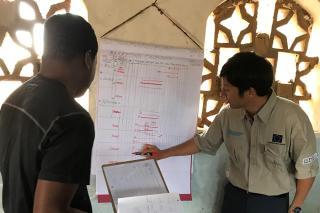In landlocked Zambia, close to 60 per cent of households engage in some form of agricultural activity, much of it for their own consumption. Yet, the contribution of agricultural production to the gross domestic product has been steadily declining, from 24 per cent in the year 2000, to just 2.6 per cent in 2019. Closely related to an increase in climactic events and pest and disease incursions, Zambia is now anticipating further repercussions on agricultural productivity due to the impact of COVID-19 throughout the food value-chain.
For Zambians, food insecurity is an urgent issue. Around 18 per cent of the country’s rural population require urgent action to protect their livelihoods. A further 15 per cent are only marginally able to meet their food needs, while three per cent of the country’s 17.8m people are already facing considerable food gaps.
The health and nutrition impacts are pronounced, particularly for children. Close to half of the population are categorized as undernourished, while 34 per cent of children under the age of five experience stunted growth. The mortality for children in this age group is currently 5.4 per cent.
Key to improving the food security situation is to look at new methods to increase agricultural productivity. This includes partnering with farmers to look at ways to sustainably intensify the production of key crops – such as in wheat and maize – in smallholder farming systems.
UN Volunteer Hiroaki Sonoda (Japan) came to Zambia in March 2020 as a Value Chain Development Specialist with the Food and Agricultural Organization (FAO). He was assigned to two projects: an EU-funded initiative on Sustainable Intensification of Smallholder Farming Systems in Zambia (SIFAZ) and an FAO regional technical cooperation programme on Opportunities for Youth in Africa: Accelerating Jobs Creation in Agriculture and Agribusiness (OYA).
For the SIFAZ project, I took on a key role in strategic planning to establish economically-sustainable farming. I produced agribusiness and marketing information, including data and statistics for inclusion in technical reports, and assisted in mapping marketing opportunities and creating market linkages. --Hiroaki Sonoda, UN Volunteer Value Chain Development Specialist with FAO in Zambia
“The SIFAZ project tackled critical issues – including food insecurity, malnutrition, gender inequality and sustainable management of the resource base,” Hiroaki explained. "The project engaged national stakeholders, including the Ministry of Agriculture, as the main implementation partner. FAO trained officers at all levels from headquarters to villages, to ensure technical knowledge transfer and oversaw how this knowledge was cascaded to farmers, ensuring local governments enhanced their capacity to tackle issues on the ground,” he said.

Hiroaki’s contribution to the project reached 16,000 farmers in 150 cooperatives located in 27 districts across the country. Aligned to Zambia’s National Agricultural Investment Plan, Hiroaki’s work supported the country response to the identified and growing need of sustainably intensifying small-holder farming systems to improve food security and economic welfare.
Hiroaki's assignment was funded by the Government of Japan as part of the Global Human Resource Development Programme for Peacebuilding and Development (HRD).
This article was prepared with the kind support of Online Volunteers Helen Maccan and Nadine Schilg.

